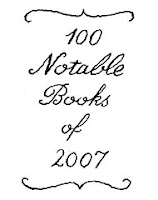The
2007 National Book Award Winners were announced today, November 15. The winning titles with publisher descriptions are listed below. Click on any title to see if it's available at the library.
I've not read any of these books yet, but have read quite a number of terrific reviews about the fiction winner
Tree of Smoke. Maybe a good read for the Roundtable once it comes out in paperback.
 Fiction WinnerTree of Smoke
Fiction WinnerTree of Smoke by Denis Johnson
This is the story of Skip Sands—spy-in-training, engaged in Psychological Operations against the Vietcong—and the disasters that befall him thanks to his famous uncle, a war hero known in intelligence circles simply as the Colonel. This is also the story of the Houston brothers, Bill and James, young men who drift out of the Arizona desert into a war in which the line between disinformation and delusion has blurred away. In its vision of human folly, and its gritty, sympathetic portraits of men and women desperate for an end to their loneliness, whether in sex or death or by the grace of God, this is a story like nothing in our literature.
---------------------------------
** According to an
SFGate.com article, Denis Johnson is a resident playwright for the San Francisco theater group Campo Santo.
 Non-Fiction WinnerLegacy of Ashes: The History of the CIA
Non-Fiction WinnerLegacy of Ashes: The History of the CIA by Tim Weiner
For the last sixty years, the CIA has managed to maintain a formidable reputation in spite of its terrible record, burying its blunders in top-secret archives. Its mission was to know the world. When it did not succeed, it set out to change the world. Its failures have handed us, in the words of President Eisenhower, “a legacy of ashes.”
Now Pulitzer Prize–winning author Tim Weiner offers the first definitive history of the CIA—and everything is on the record. LEGACY OF ASHES is based on more than 50,000 documents, primarily from the archives of the CIA itself, and hundreds of interviews with CIA veterans, including ten Directors of Central Intelligence. It takes the CIA from its creation after World War II, through its battles in the cold war and the war on terror, to its near-collapse after 9/ll.
 Poetry WinnerTime and Materials
Poetry WinnerTime and Materials by Robert Hass
(On Order. You can place a hold.)
The poems in Robert Hass's new collection—his first to appear in a decade—are grounded in the beauty and energy of the physical world, and in the bafflement of the present moment in American culture. This work is breathtakingly immediate, stylistically varied, redemptive, and wise.
His familiar landscapes are here—San Francisco, the Northern California coast, the Sierra high country—in addition to some of his oft-explored themes: art; the natural world; the nature of desire; the violence of history; the power and limits of language; and, as in his other books, domestic life and the conversation between men and women. New themes emerge as well, perhaps: the essence of memory and of time.
----------------------------------------
** According to
an SFGate.com article, Robert Hass is a U.C. Berkeley professor and served as a U.S. poet laureate. On a personal note, Hass has written some of my all-time favorite poems. Here's one I love for it's humor and emotional punch:
Forty Something
She says to him, musing, 'If you ever leave me, and marry a younger woman and have another baby, I'll put a knife in your heart.' They are in bed, so she climbs onto his chest, and looks directly down into his eyes. 'You understand? Your heart.'
 Young People's Literature WinnerThe Absolutely True Diary of a Part-time Indian
Young People's Literature WinnerThe Absolutely True Diary of a Part-time Indian by Sherman Alexie (On Order. You can place a hold.)
In his first book for young adults, bestselling author Sherman Alexie tells the story of Junior, a budding cartoonist growing up on the Spokane Indian Reservation. Determined to take his future into his own hands, Junior leaves his troubled school on the rez to attend an all-white farm town high school where the only other Indian is the school mascot. Heartbreaking, funny, and beautifully written, The Absolutely True Diary of a Part-Time Indian, which is based on the author's own experiences, coupled with poignant drawings by acclaimed artist Ellen Forney, that reflect the character's art, chronicles the contemporary adolescence of one Native American boy as he attempts to break away from the life he was destined to live.
 The New York Times Book Review has announced its top 10 books for 2007. Luckily, one of the few fiction books I read for pleasure this year is on the list: Then We Came to the End by Joshua Ferris. I didn't read it for bragging rights, but since I have the opportunity...why not? I also happened to think that it was a terrific book--especially for those that experienced the boom/bust cycle of the 90's first hand.
The New York Times Book Review has announced its top 10 books for 2007. Luckily, one of the few fiction books I read for pleasure this year is on the list: Then We Came to the End by Joshua Ferris. I didn't read it for bragging rights, but since I have the opportunity...why not? I also happened to think that it was a terrific book--especially for those that experienced the boom/bust cycle of the 90's first hand.












